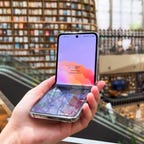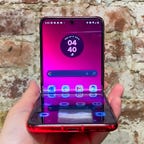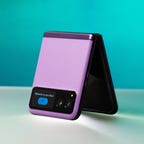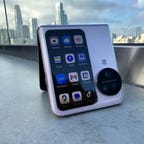We’ve seen several generations of foldable phones, and the latest is pretty great. Samsung recently unveiled its newest flip and fold phones at Galaxy Unpacked, Motorola debuted its new Razrs and Google’s Pixel 9 Pro Fold continues the trend of long, awkward names for foldables. Meanwhile, the Huawei Mate XT is setting a new benchmark with its tri-fold form factor, but likely won’t be purchasable (or even fully usable) in the US. What all of this means is that there are at least six new foldable phones in the wild, but we haven’t been able to review them all yet. But that isn’t going to stop us from steering you towards the best folding phone you can buy today.
Of course, the decision to buy a foldable isn’t exactly an easy one yet. They have their drawbacks, including higher price tags, longevity issues and potential repair costs, but the clever bendable displays offer a fun experience that you simply don’t get with regular smartphones.
So far, Samsung’s Galaxy Z line has the lead with the most iterations of folding phones with its two foldable designs — the book-style folding tablet Galaxy Z Fold series and flip-phone-like Z Flip series — but it’s no longer the only company with skin in the game.
The Pixel Fold is the first folding phone from Google, which is a good effort, despite a few quirks. Motorola’s folding 2023 Razr Plus flip phone also scored well in our review, and the company’s cheaper Razr is the most affordable attempt we’ve seen to date. We like OnePlus’ first attempt at a foldable phone, too. And there are also folding phones from Honor and Oppo, which are solid options for people in Europe, but they’re not on sale in the US. However, if you’re looking for a folding iPhone, there’s still no sign of one. Sorry, Apple fans.
Folding phones come in two main varieties for now: candybar, book-style phones, which open up like a book to become larger, tablet-sized devices (like the Samsung Galaxy Z Fold 5), and candybar, flip-style phones, which fold in half to become smaller and more pocketable (like the Galaxy Z Flip 5 and Moto Razr series). Because of the still-recent technology, all foldables are more expensive than their regular smartphone equivalents, making them a luxury option. But if you’re looking to turn heads when you whip out your foldable display and bend your phone in half, they’re worth looking into. Here are our picks for the best foldable phones available now.
We’d be remiss not to mention again that Motorola, Samsung and Google all launched their latest models in the past few weeks. So we’re still testing and reviewing these devices and haven’t included them in this guide. With that in mind, it might be worth holding off on buying a new foldable phone until you see what these new models have to offer.
What’s the best foldable phone?
The Samsung Galaxy Z Flip 5 sits at the top of our list of best foldable phones, largely because it has an approachable price for a foldable. At $1,000, it is still expensive, but we believe it packs a lot for that price. The design and build quality feel sturdy, the software is polished, and the Z Flip gets four years of Android version support. On top of it all, the clamshell form factor and large cover screen make it one of the most portable and fun phones you can own.
Best foldable phones
The Samsung Galaxy Z Fold 5 is an incremental improvement that further refines Samsung’s large-screened foldable. If you’re looking for a phone that can double as a tablet for viewing work-related documents, running multiple apps on screen at once or watching movies, the Galaxy Z Fold 5 is our top choice. The Google Pixel Fold may have better cameras, but the Galaxy Z Fold 5’s bright screen makes Samsung’s phone better at its intended purpose: providing a big display that fits in your pocket.
The Galaxy Z Fold 5’s $1,800 price is still hard to swallow and puts the phone out of range for most people. But if you can afford it, this large folding phone is the best iteration of Samsung’s phone-tablet hybrid yet. Read our Samsung Galaxy Z Fold 5 review.
Google got a lot of things right with its first attempt at a folding phone. The large outer screen is great for use when the phone is closed, and its slim design means it doesn’t stretch your pockets too much. And its a book-style foldable that closes totally flat, too, which makes it very usable as a regular phone when snapped shut, while still letting you take advantage of the 7.6-inch internal screen when you need it.
Its overall performance is solid and the camera system is good, too, making it a great all-rounder if you want to dive into the exciting world of foldable phones. Read our Google Pixel Fold review.
The Galaxy Z Flip 5 is the biggest leap forward Samsug’s flip phone has seen in years. Samsung has significantly expanded the size of the cover screen located on the outside of the device, meaning you can look up directions, take photos and send messages without opening the phone. It’s this combined with the Z Flip’s solid battery life and sturdy design that makes it a top pick.
The Galaxy Z Flip 5 may be our favorite flip phone, but there are still some drawbacks to be aware of. At $1,000, it’s still expensive for a phone without a telephoto camera. And not all apps work natively on the front screen as they do on the Motorola Razr Plus.
The Motorola Razr Plus raised the bar for what a flip phone should be in 2024. Its 3.6-inch cover screen allows you to use almost any app without opening the phone, plus battery life is long enough to get you through a busy day. It’s also thinner than the Galaxy Z Flip 5, which could make it the ideal choice for those who prioritize portability in a phone.
While I recommend the Galaxy Z Flip 5 as the best flip phone overall, the Razr Plus is worth considering if you prefer a thinner design and want to use more apps on the phone’s outer display without much extra fuss. The Razr Plus felt more fragile than the Galaxy Z Flip 5 during testing, but it’s certainly thinner, making it a great choice for those who care about compactness above all else. Read our Motorola Razr Plus review.
The Motorola Razr 2023 is the most affordable and widely released foldable phone, with a $700 price tag that’s well below the $1,000 starting price of clamshell foldables like the Razr Plus and Samsung Galaxy Z Flip 5. Motorola made some obvious compromises for affordability, like losing its competitors’ full-front screen for a 1.5-inch thumbnail-size external display.
Less obvious are the more painful shortfalls: only three years of Android OS updates and 128GB of non-expandable storage (you’ll have to rely on cloud storage if you go over). If you can stomach those compromises, the Razr 2023 is a great phone, with a svelte design, a large 6.9-inch main display and a sharp 64-megapixel main camera (the less said about its other ultra-wide lens, the better). It’s a phone that suits a specific niche: folks who want to try out foldables for a few years but don’t want to shell out a lot of money if they’re still iffy on whether this “flexible display” thing will take off. Read our Motorola Razr 2023 review.
Oppo’s Find N3 Flip phone is unique for two reasons: It has a telephoto camera and a vertical cover screen, unlike the Samsung Galaxy Z Flip 5 and Motorola Razr Plus. That could make the Find N3 Flip an ideal choice for people who want closer zoom shots, though this phone also shines for its fast performance, stylish design and speedy charging. The crease on the interior screen is also impressively subtle. That said, there are some downsides. The Find N3 Flip lacks wireless charging, and you’ll be able to buy it from authorized retailers only in certain markets — and that doesn’t include the US (although resellers are an option you can consider). Read our Oppo Find N3 Flip review.
The Open is the first foldable from phone-maker OnePlus. It’s not a bad first effort, with great-looking hardware that feels premium to hold and helps the Open stand out from its competitors. In our review, we liked the good battery life and the fast wired charging. Its generous 6.3-inch outer display unfolds to reveal a 7.82-inch inner display that’s great for watching videos on the go.
But it feels rough around the edges compared to Samsung’s Z Fold 5, with the camera performance and some software optimizations leaving us feeling a touch underwhelmed. At $1,700, it’s tough to recommend the Open over Samsung’s foldable, but if you want to feel like you’ve got a device that few others out there have, it’s certainly not a bad phone to consider. Read our OnePlus Open review.
Shop Black Friday: Look for sales and deals close to holidays, especially Amazon’s Prime Day and Black Friday.
Consider last year’s models: When a new phone gets launched, stores and carriers discount their older phones to sell off existing stock.
See the phone in person: It’s worth going to a store and trying out a potential phone. You may love or hate the way it looks and feels.
Budget for a case: Foldable phones sold today are more durable than phones from even a few years ago, but it still might be a good idea to protect your phone with a case to keep it in tip-top shape.
We test every phone in real-world scenarios, focusing on its features, design, performance, cameras, battery life and overall value. We document our findings in an initial review that is periodically updated when there are new software updates, or to compare it against new phones from competitors such as Apple, Samsung, Google and OnePlus.
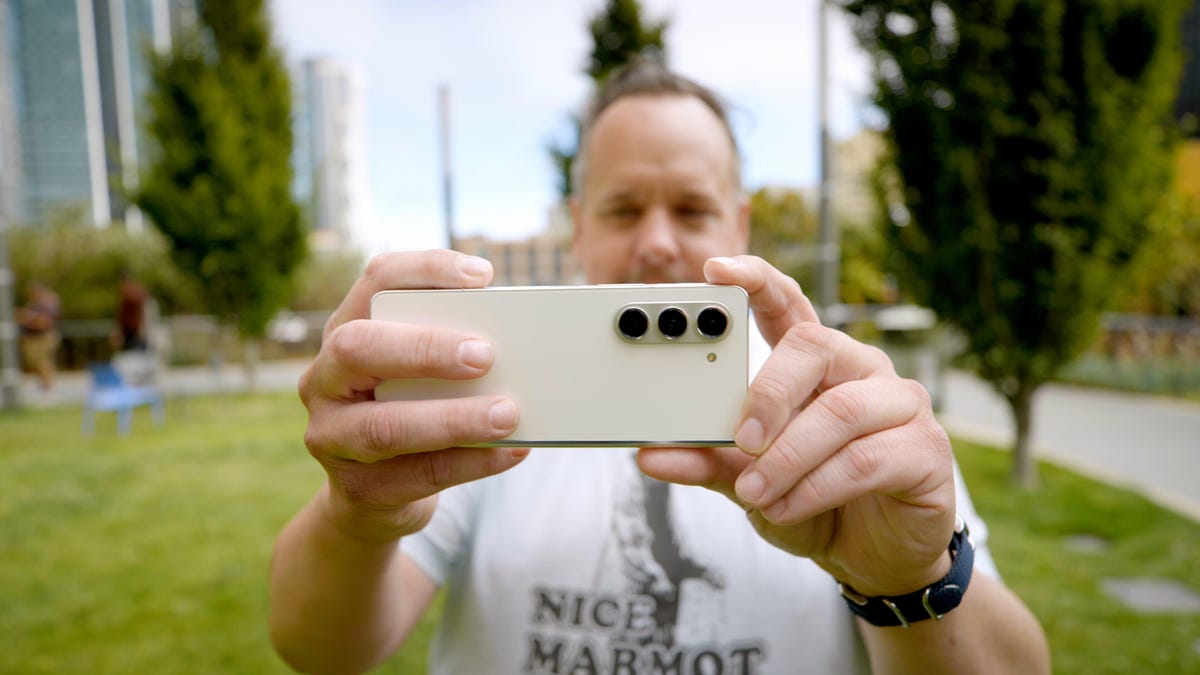
Photography
Photography is a major focus for most phones these days, so we take pictures and videos of various subjects in a variety of settings and lighting scenarios. We try out any new camera modes, such as ProRes Log video that debuted with the iPhone 15 Pro and 15 Pro Max, or the Magic Editor photo tool that launched with the Google Pixel 8 series.
Battery life
Battery testing is conducted in a variety of ways. We assess how long a phone lasts during a typical day of use and note how it performs during more focused sessions of video calls, media streaming and gaming. We also conduct a video playback test, as a simple, replicable measure of pure battery life, which isn’t always included in the initial review but sometimes added later in an update.
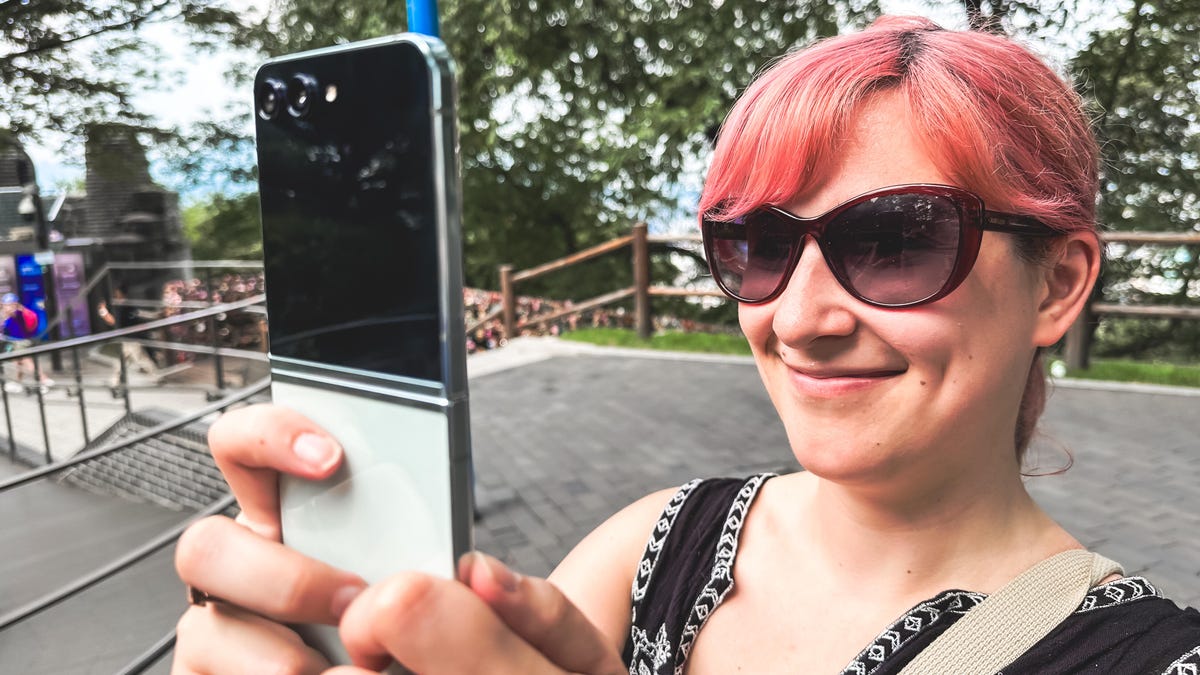
The Galaxy Z Flip 5 largely has the same camera hardware as the Z Flip 4. But the new chip brings some image processing improvements.
Performance measuring
We use benchmarking apps to measure each phone’s performance, alongside our own anecdotal experiences using the phone for our review. Most noteworthy is how graphics and animations look. Are they smooth? Do they lag or stutter? We also look at how quickly the phone switches between horizontal and vertical orientations, and how fast the camera app opens and is ready to take a photo.



